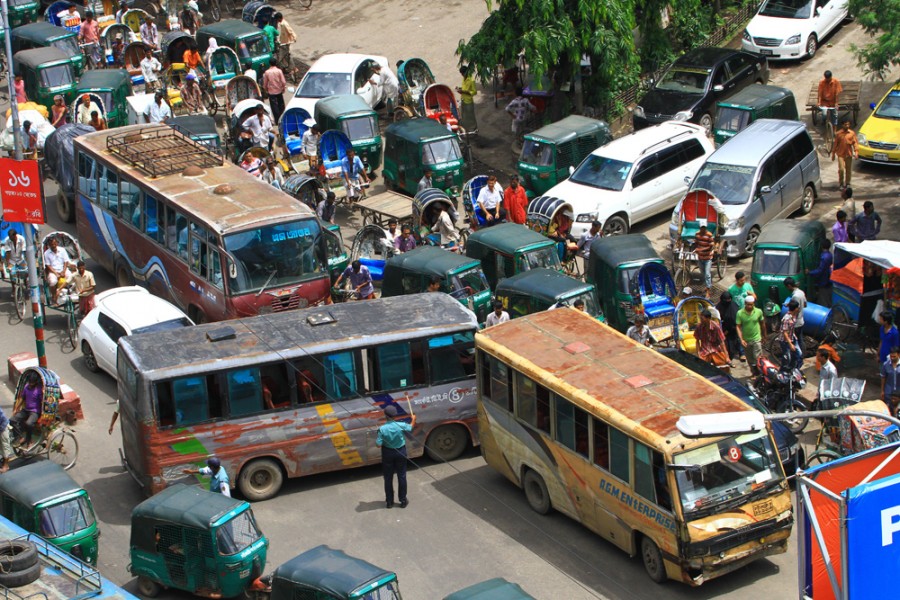After keeping the people in suspense over implementation of the Road Transport Act 2018 for months, the declaration for its introduction came all on a sudden. However, the way it is being enforced gives a clear impression that the implementers are not ready for the job at hand. Then, the concentration of activities on roads in the capital may give the wrong impression that the legal provision is meant only for Dhaka City. Enforcement of any such law should cover other cities and towns as well as roads and highways of the country.
Here the matter is intriguing. Reportedly, the legal act has not as yet got its rules and regulations framed for explaining the nitty gritty and the modalities of implementing them. Also members of the Dhaka Metropolitan Police's traffic wing are undergoing training right now. This means the precondition for implementation of a most important law has not been fulfilled. So by putting the cart before the horse what message do the authorities want to give? That the on-duty traffic officers are not apparently taking punitive actions against traffic violators just yet 'may go to their credit' but it does in no way help enforce discipline on city roads.
For long the authorities sat on this road transport act. Had the Bangladesh Road Transport Authority been serious about setting a deadline for the law's implementation, it would not have found itself in such a predicament. The training for adequate members, if not all, of the traffic wing of the police should have been completed well before deploying them on roads and highways. It is known that cases to be filed against traffic rule violators will no longer be maintained under the slip system. But the POS (point of sale) software device, it is told, is in the process of updating. This means, if a case has to be lodged against an errant driver or an unfit vehicle, either old slips have to be used or filing a case has to be entirely avoided. Currently, though, drivers are just advised or admonished for minor faults or breach of traffic rules. One wonders what action will be taken when there is a major violation in the intervening period before the new transport act is fully implemented.
Now there is a catch 22 situation. The minister of road transport and bridges stated that no cases would be filed in the first week but a publicity or awareness campaign would be conducted before implementation of the law from the next week. An additional police commissioner (traffic) told earlier that the law would come into effect from Monday (November 4). Reports have it that the traffic police will take another month for developing their website. Before that slips will be used for framing case but no such slips have reached the field-level officers.
All this is evident enough, that the departments, ministries and agencies responsible for implementation of traffic rules and regulations lack coordination. That they are ill-prepared for the purpose stems from no ground works having been done in all seriousness before the introduction of the Act. One hopes this sudden move has not come from any motive: If it can be proved that the law is impractical for implementation in the context of obtaining reality, avenues can be kept open for future laxity?
The common people may not be all that serious in familiarising themselves with the details of legal provisions. For example, the drivers have tried to know this much that they will be fined heavily for violation of traffic rules and the punishment awarded ranges up to life imprisonment or even death penalty. Even a pedestrian may be fined Tk 10,000 under the new law (as against Tk 200 under the preceding law) for crossing roads anywhere instead of using zebra crossing and foot overbridge. True, passengers and pedestrians all should play a responsible role in using city space in order to materialise discipline. But it is the drivers of vehicles, on whose responsible driving accidents can be curbed to the minimum and tailbacks curtailed to a tolerable level.
As for crossing of roads anywhere and everywhere, all will agree that this cannot be entertained. But then, foot overbridges at many crucial crossings have been dismantled and zebra crossings at some points obstructed for works of metro rail. According to the law, the traffic police are supposed to help pedestrians to cross such road points. But if there is no such help available, what do pedestrians do?
Beside lack of preparation on the part of implementers, the mismanagement of traffic signals and other deficiencies in the infrastructure should not go out of sight. Why are there no well-furnished bus stops in the city? Such bus stops should be carved out of sidelines in order to leave the entire road space unobstructed for other vehicles to move when one picks up passengers. Physically challenged persons should have facilities there to avail of public bus service. Finally, the hand signalling by traffic constables is archaic, arbitrary and inherently defective. Traffic signals have been rendered disused. Why? Without putting all such things in order, no law can be implemented to people's satisfaction.


